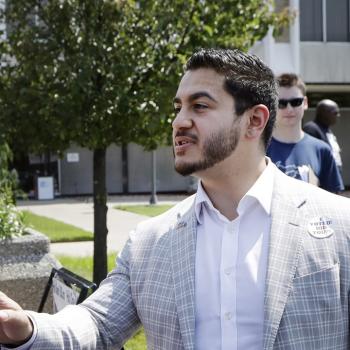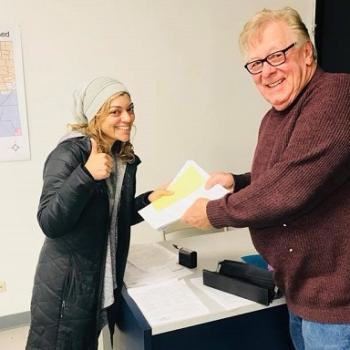 |
|
Camels are funny, too
|
When comedian Albert Brooks went “Looking for Comedy in the Muslim World” last year with his appropriately named movie, many felt that the search was was in vain (and the movie, subsequently… er, bombed). But the surprising success of “Little Mosque on the Prairie” – the Muslim-themed sitcom whose debut this month drew the Canadian Broadcasting Corporation’s (CBC) largest audience in a decade – turned all that on its head (the first episode can be viewed here). The groundbreaking show required a deep familiarity with both Muslim and Western mainstream cultures, a commitment to the basic requirements of a good situation comedy, and most of all, a desire and drive to make what would otherwise seem impossible – a Muslim sitcom – a reality. “Little Mosque” creator Zarqa Nawaz, a mother of four from Regina, Saskatchewan, started out making short films over 10 years ago reflecting the humor of being Muslim in North America (and especially in the rural Canadian town where she lives) before realizing that there was enough material to build an entire TV show. With the cooperation of the CBC, which devoted significant resources to the project, “Little Mosque” was born, and Muslims can now see characters on TV that quite possibly look like the ones in their own community. The success of the debut has sparked significant interest and curiosity from several international markets (in the US, Europe, and the Middle East) where the show could be syndicated. Though some (non-Muslim) detractors claim the show whitewashes more serious issues (terrorism, women’s rights) or denigrates non-Muslims, and some Muslim ones bristle at the character types and situations in which they find themselves, Nawaz wants the show to be entertaining above all and has sought a balance that has left the majority of critics (and Muslim viewers) cautiously approving. alt.muslim’s Zahed Amanullah caught up with Zarqa from her home in Regina, where she is reflecting on the early success of her television debut.
![]() Congratulations on the success of your show.
Congratulations on the success of your show.
Thank you very much.
![]() The last time we met five years ago, you were in San Francisco screening some of your short films. How did you get from there to this sitcom that has been received so well?
The last time we met five years ago, you were in San Francisco screening some of your short films. How did you get from there to this sitcom that has been received so well?
Just, you know, growing up as a Canadian with experiences and observations in the mosque and with my friends and family, I thought there was enough material in daily life as a Muslim that I could spin it in terms of a sitcom. So I pitched it to the network and everybody liked the idea. It went into development for a couple of years and we shot the first eight episodes, the first of which aired (this month). We’ve had an incredible response… I think we’ve hit a nerve and it’s been, alhamdulillah, great so far.
![]() I’ll give you a little chance to be patriotic. Why has this happened in Canada and not in America or Britain, which have larger Muslim populations? Does it have to do with the culture there or is it maybe just the opportunities you’ve been able to find?
I’ll give you a little chance to be patriotic. Why has this happened in Canada and not in America or Britain, which have larger Muslim populations? Does it have to do with the culture there or is it maybe just the opportunities you’ve been able to find?
I think Canada, you know, we were one step removed from 9/11 so that rawness wasn’t there in the country. The networks were more willing to take a chance on a subject like this. Also, the network here is the CBC (the Canadian Broadcasting Corporation), which is a publically owned and funded television station. It’s a not-for-profit station so they don’t have to worry about profit-making as much as representing the diversity and the regionality of the country.
I think the reason it wasn’t made in Europe was because the Muslim experience in Europe has been very different than the Muslim experience in North America. For the most part, the Muslim community has been far more assimilated and has integrated more successfully in North America. The rates of employment and income are much higher and therefore you have a different population which doesn’t have a lot of anger on its shoulder. And I think comedy has to come from a good place, a place where someone is fairly well adjusted and happy with her surroundings. Those combinations together, I think, resulted in the show coming out of Canada first.
![]() One of the things I was intrigued by in the first episode… you really touched on a lot of issues that Muslims find humourous that maybe a lot of non-Muslims wouldn’t be familar with. Was this a conscious decision to sort of push the envelope and introduce these issues to a non-Muslim audience without sort of having to hand hold them through? I’m thinking of the Ramadan moonsighting, for example.
One of the things I was intrigued by in the first episode… you really touched on a lot of issues that Muslims find humourous that maybe a lot of non-Muslims wouldn’t be familar with. Was this a conscious decision to sort of push the envelope and introduce these issues to a non-Muslim audience without sort of having to hand hold them through? I’m thinking of the Ramadan moonsighting, for example.
I don’t think there were any conscious decisions really made that much other than trying to make it funny and entertaining, and yet sort of explain the issues that exist in the community – both non-Muslim and Muslim – and sort of bring out the misunderstanding and the paranoia that exists on both sides. And the moonsighting was innocuous when it comes to the Muslim community – it’s almost sort of an iconic symbol of disorganisation that every Muslim in the world can relate to! So I wanted to bring out those issues that non-Muslims sort of go, “Ok, so they have these kooky things that go on in their faith community like we do.” Anyone who belongs to a faith community can recognise the stereotypes that exist in a mosque because they also exist in their houses of worship. So the primary motive was to make it fun and humourous and to get people to laugh. Ultimately if it’s not engaging and entertaining, people won’t watch it and we won’t get the ratings to get renewed. That, ultimately, was our priority.
![]() I also noticed Zaib Shaikh, who plays the imam Amaar, happens to be Muslim. Did you go out of your way to invite Muslim actors to participate?
I also noticed Zaib Shaikh, who plays the imam Amaar, happens to be Muslim. Did you go out of your way to invite Muslim actors to participate?
Actually, we went for the best actors that were out there, because we felt the priority for the show was good acting over getting Muslim actors who happen to be really bad at what they do, because then that would show in production and then nobody would want to watch the show in the end. So, good intentions aside, you have to have the best actors possible. Zaib Shaikh just happened to be Muslim, but he wasn’t hired because he was Muslim.
At the end of the day, you have to get the best writing team, the best actors, the best directors. You have to get the best team together to make the best show. And then you can teach those things to actors because, after all, they are actors and their job is to pretend to be other people.
![]() Earlier last year, you had another documentary that you did for the CBC, Me and the Mosque, which went into issues about women’s access to mosques. I noticed for one of the episodes, you integrated that issue in. Could you tell us about that?
Earlier last year, you had another documentary that you did for the CBC, Me and the Mosque, which went into issues about women’s access to mosques. I noticed for one of the episodes, you integrated that issue in. Could you tell us about that?
Yeah, a big issue in my life has been barriers and discrimination in mosques throughout the world and I think that’s something I want Muslims to start talking about in greater numbers. So, I made a documentary about the barriers and the partitions that go up between men and women in mosques. It got a lot of play in the Muslim community, but I’ve also made it a topic of the second episode because I know that it’s an issue that I really, really want to push the Muslim community to start talking about, because to me it’s a metaphor for a bigger issue when it comes to how Muslims deal with women in their community. And I think as Muslims we really have to start talking about these issues if we’re ever going to get to the place where we can start solving them.
![]() You have eight episodes that have already been made, right?
You have eight episodes that have already been made, right?
Yeah.
![]() Is there potential for more if these eight are well received?
Is there potential for more if these eight are well received?
Yeah, we’re hoping to go into a full season by September 2007.
![]() Do you have plans for other things? I know you started out as a filmmaker (the short films BBQ Muslims in 1996 and Death Threat in 1998) before going into documentaries and, of course, this sitcom. Is there anything else on your plate that you’d like to share with us?
Do you have plans for other things? I know you started out as a filmmaker (the short films BBQ Muslims in 1996 and Death Threat in 1998) before going into documentaries and, of course, this sitcom. Is there anything else on your plate that you’d like to share with us?
Well, you know, I’d like to move into feature films and maybe even create another series based in the US. I’d like to do a lot of different things, inshallah, in the future.
Zahed Amanullah is associate editor of altmuslim.com. He is based in London, England.











